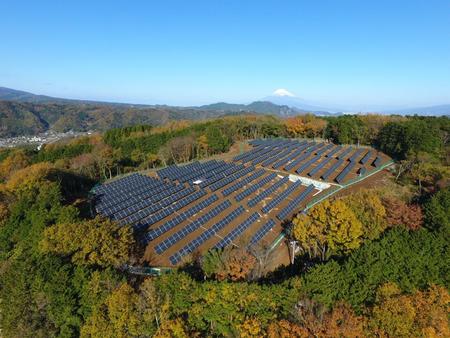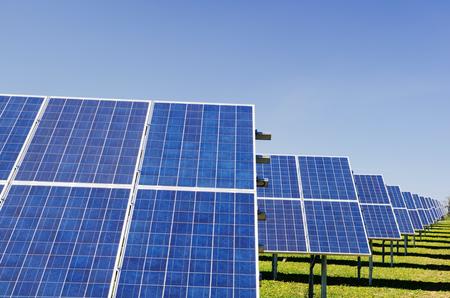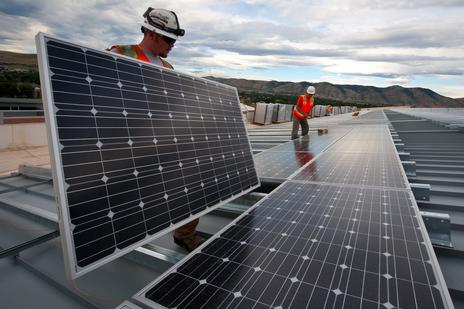RE100, led by the Climate Group in partnership with CDP, is a global initiative bringing together the world’s most influential businesses committed to sourcing 100% renewable electricity. Our members operate around the world, spanning sectors from manufacturing and pharmaceuticals to fashion and technology. Together, they send a powerful signal to markets and governments about the demand for renewable electricity.
Last week, the climate movement welcomed a new administration into the White House and celebrated as the US rejoined the Paris Climate Agreement. President Biden campaigned with a goal of achieving “a carbon pollution-free power sector by 2035” — RE100 members have been working diligently in the US for years already in order to get us there.
The 2020 RE100 Progress and Insights Annual Report, which collected and analyzed member data up through the end of 2019, found over 260 RE100 members around the world representing over 278 terawatt hours per year (TWh/yr) of demand for renewable electricity.
Of those members, 152 submitted country-level data to RE100, with 100 of them reporting a footprint in the US, for a total of over 35 TWh of annual electricity demand in this market. Overall, those 100 are meeting 62% of their US demand with renewable electricity, including 38 members who reported accounting for 100% of their US electricity needs with renewables. This is a huge success and shows true leadership in a market where renewables represented only 11% of overall electricity consumption in 2019.
These 38 members, who are powering 100% of their electricity needs in the US with renewables, hail from a diverse cross-section of industries*. Together, they represent a total of over 12 TWh of consumption - more than the electricity used by the entire state of Maine in 2019.
Some of them have also achieved their overall RE100 commitment of procuring 100% renewable electricity for their worldwide operations by the end of 2019; others are still working toward their global RE100 pledge, with their success in the US representing an important milestone.
The 38 members are leaders in the transition to zero-carbon electricity grids. They invested in both wind and solar power to achieve 100% in the US through a variety of instruments, including unbundled Energy Attribute Certificate (EAC) purchases, direct procurement from off-site grid-connected generators (PPAs), contracts with suppliers, (green electricity tariffs/products), self-generation, and purchases from on-site installations owned by a supplier.

We spoke to some of these 38 companies who have reached 100% renewable electricity in the US to learn how they got there and discuss the challenges they faced on their journey.
Innovative Projects
While procurement options like renewable energy credits (RECs) and EACs, as well as PPAs and on-site installations, are well-proven for the US market, some of these 38 companies also pursued more innovative instruments and types of renewable projects that could serve as an inspiration to others. Among others, some of the examples members provided include:
Investing in efficiency and creatively citing renewables
- Goldman Sachs, Hudson Pacific Properties, and QBE all cited their focus on investing in energy efficiency as critical to their success in procuring renewable electricity. QBE is optimizing the amount of office space they occupy and implementing efficiency measures, including lighting upgrades across multiple locations while Goldman Sachs is reducing their energy use intensity by 20% across their offices and consolidating their real estate portfolio.
- In December 2019, Hudson Pacific completed construction for Los Angeles’ first commercial building to implement facade solar panels into the building’s envelope. Today fully leased by Netflix, the building also features energy-efficient plumbing fixtures and lighting controls, which reduce energy use by 15%.
- In 2020, Voya Financial opened a newly-constructed office in Arizona featuring solar carports that are expected to offset more than 663MWh of electricity per year - a third of the building’s consumption. They are also committed to looking holistically at their office spaces, investing in efficiency, optimizing heating and lighting systems, and responsibly sourcing internal fixtures, including recycled and upcycled materials.
"We are passionate about driving positive change and stimulating demand for renewable energy is a key element of this. We have achieved 90% renewable electricity across our global footprint and are committed to achieving 100% by 2022. The fact that we, along with many of our partners in the RE100, have achieved 100% renewable energy in the US, proves that close collaboration is driving the systemic change we need to make a real difference.”
"We are passionate about driving positive change and stimulating demand for renewable energy is a key element of this. We have achieved 90% renewable electricity across our global footprint and are committed to achieving 100% by 2022. The fact that we, along with many of our partners in the RE100, have achieved 100% renewable energy in the US, proves that close collaboration is driving the systemic change we need to make a real difference.”
Financial mechanisms and aggregated procurement
- Along with financing renewable energy and microgrids across the US, ING has been involved in structuring deals that encourage its clients to use renewable energy. In September 2020, ING worked with Aligned Energy to close the data center industry’s first-ever sustainability-linked loan (SLL), a lending facility where the regular pricing grid is linked to sustainability performance targets.
- In 2018, Microsoft debuted a volume firming agreement (VFA) which locks in an electricity price with a guarantee from a third-party insurer, relieving the buyer of the risk associated with renewables' variable price and output inherent in traditional PPAs. By mitigating this risk, the VFA could help expand procurement beyond large corporate buyers.
- In 2018, Swiss Re joined with 2 other RE100 members to complete a virtual power purchase agreement (vPPA) with buyer’s aggregation for 290MW of new wind and solar developments. This was especially challenging for them as a financially-regulated company, and therefore a major win.
- Likewise in 2019, Workday participated in a small aggregation vPPA which brought together five offtakers (three of whom are RE100 members) to pool their demand and collectively serve as the anchor tenant for a new 100MW solar development. The group leveraged a uniform vPPA, significantly streamlining the legal review process and minimizing transaction costs.
These collaborative projects could serve as a blueprint for accessible projects for companies that may lack choice due to size, location, or other factors.
.jpg?h=3466f500&itok=vdA3ps2z)
Nancy Mahon, Senior Vice President, Global Corporate Citizenship and Sustainability of The Estée Lauder Companies, said:
“The Estée Lauder Companies is committed to innovating to help achieve a low-carbon future. We’re so pleased to meet our 2020 RE100 commitment for North America early. Projects like the Ponderosa wind farm and others in our Net Zero portfolio are all significant achievements toward our commitments to address climate change.”
"At Interface, we’ve seen firsthand how a shift in mindset can inspire real change - not only through our organization and industry, but around the world. Today, 100% renewable electricity is an attainable goal for many entities, and we are proud that Interface is joining with the other forward-thinking companies in RE100 to encourage others to adopt new organizational behaviors."
"At Interface, we’ve seen firsthand how a shift in mindset can inspire real change - not only through our organization and industry, but around the world. Today, 100% renewable electricity is an attainable goal for many entities, and we are proud that Interface is joining with the other forward-thinking companies in RE100 to encourage others to adopt new organizational behaviors."

Challenges and Barriers
While some of the 38 companies, such as Goldman Sachs and Signify, indicated that they did not face any significant obstacle in procuring 100% renewable electricity in the US, other members reported challenges including:
Aligning critical stakeholders and committing to act
- Royal Philips, Steelcase, and others mentioned difficulties getting the sign-off required to commit to their first PPAs, due to the long (12- and 15-year) contract periods.
- Similarly, Biogen, Interface, and others stated that procurement was not their biggest obstacle, but rather setting aggressive targets to inspire internal teams, making public commitments, and effectively engaging stakeholders on the positive impacts of renewables. Specifically, Hudson Pacific and others mentioned the difficulty of navigating interactions between landlords and tenants, particularly on cost.
Overall, many RE100 members cited the importance of communicating widely about sustainability accomplishments as critical to their overall success.
"Reaching our RE100 target in the US is an important milestone for YOOX NET-A-PORTER GROUP, following our previous success reaching 100% renewable energy across our Italian operations in 2018. We are very proud of this achievement and all of our Facility and Energy Management team who have led this program in the US. Our next goal is fulfilling the same target across all our owned global facilities, as part of our long-term journey to reduce carbon emissions and become climate positive."
"Reaching our RE100 target in the US is an important milestone for YOOX NET-A-PORTER GROUP, following our previous success reaching 100% renewable energy across our Italian operations in 2018. We are very proud of this achievement and all of our Facility and Energy Management team who have led this program in the US. Our next goal is fulfilling the same target across all our owned global facilities, as part of our long-term journey to reduce carbon emissions and become climate positive."
Overcoming issues of cost, risk, and credible supply
- Elopak, Interface, QBE, and Workday all found it challenging to identify renewable electricity offerings from local suppliers in certain markets, particularly suppliers who can provide the proper documentation of RECs. Interface made sure to use Green-e certified RECs to ensure their confidence in the validity of their US sources, while QBE is exploring on-site solar as a result of this challenge.
Check out part II of this feature where we explore how members are going beyond 100% and get their perspective on the future of corporate renewables.
*RE100 members who had accounted for 100% of their electricity demand in the United States with renewables, as of the end of 2019, include: Amalgamated Bank, Atlassian, Aurora Organic Dairy, Bank of America, Biogen, Burberry, Elopak AS, Goldman Sachs, Hudson Pacific Properties, IKEA US, ING, Interface, Logitech, McKinsey & Company, Microsoft, QBE Insurance, Royal Philips NV, SAP America, Inc., Signify, Steelcase Inc., Swiss Re, TD Bank, The Estée Lauder Companies, VMware, Voya Financial, Workday, YOOX NET-A-PORTER,

Rodney O. Martin, Jr., Chairman and CEO, Voya Financial, Inc., said:
“Our commitment to renewable electricity, and our sustainability mindset, is embedded in Voya's culture, and reflected in the purposeful actions of our people. We are proud to earn recognition as an RE100 member through our continued leadership in the adoption of clean-energy practices.”

